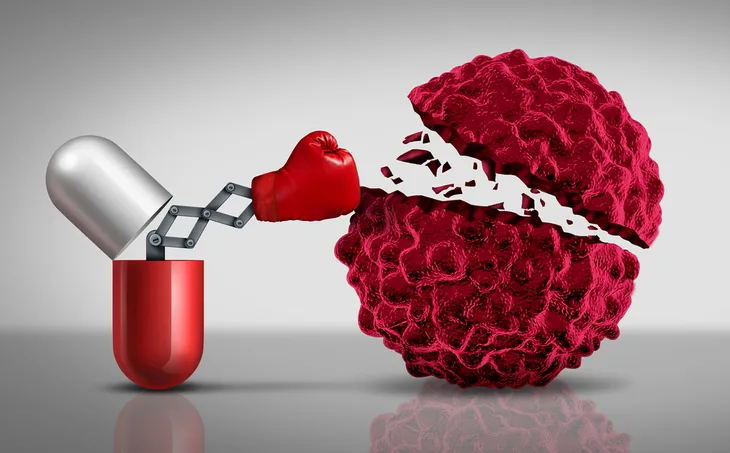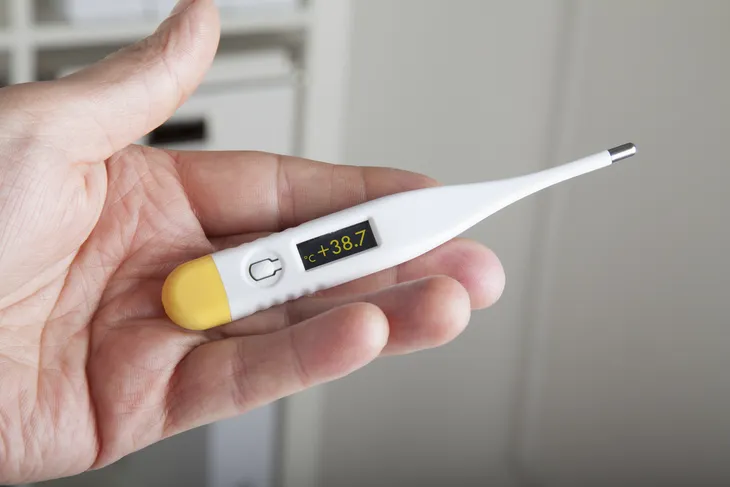Most of us have been affected by cancer in some way or another, whether it’s through a friend, family member, or even a personal experience. No matter who or what type of cancer, any diagnosis is terrifying. Even though there is no cure, researchers have made progress. If caught early, many cancers now have a high survival rate thanks to radiation, chemotherapy, and one of the newest forms of treatment — immunotherapy.
Immunotherapy is one of the lesser known treatments for cancer that is not commonly talked about. This type of therapy uses the body’s immune system to try and fight off cancer. It can be used on its own or in tandem with other treatments and has proven to be very effective. While it’s definitely got its benefits, there are some downfalls. One of the major cons of immunotherapy are the side effects, including these 12…
What is Immunotherapy?
Before we dive into the side effects, let’s first really get a good understanding of what immunotherapy is. Unlike chemotherapy or radiation therapy, which are known for being incredibly harsh and attacking even the healthy cells in the body, immunotherapy is a little more targeted. It’s a form of cancer treatment that uses a person’s immune system to help fight off diseases, such as cancer. According to the American Cancer Society, immunotherapy works in different ways. It can help stimulate the immune system so that it works harder to attack cancer cells or it can provide man-made immune system proteins to make it better equipped to fight off cancer cells.
This type of cancer treatment has become extremely important in the past few decades when it comes to treating certain types of cancers, some better than others. “Newer types of immune treatments are now being studied, and they’ll impact how we treat cancer in the future,” writes the source.
Why Does it Cause Side Effects?
Every person reacts differently to a treatment like immunotherapy. Who feels what and how depends on several different things, including the type of cancer a person has, the type of drug and its dosage, and how healthy they are when they start the treatment, says WebMD.
“Certain types of immunotherapy attack cancer or slow its spread to other parts of the body,” writes Cancer.Net. “Others make it easier for the immune system to destroy cancer cells,” says the source. One of the benefits of immunotherapy is that it doesn’t target the entire body (like chemotherapy or radiation), but in some circumstances, it can begin to attack healthy tissues and organs.
Fatigue
Fatigue is a universal side effect of most cancer treatments, and it’s no different for immunotherapy. While we all feel tired from time to time, particularly after a restless night, people who are undergoing immunotherapy will suffer from extreme fatigue.
To combat this fatigue, WebMD suggests limiting the amount of naps taken during the day because (believe it or not) excessive sleep only makes fatigue worse. Patients should also try to get some light exercise to build up their energy, eat healthy meals with lean protein, and drink lots of water. You should also limit stress by talking to friends, listening to music, or anything else that might help a person recharge.
Fever
Patients who undergo immunotherapy might develop a high fever. WebMD advises treating any temperature that is greater than 100.5-F or higher with over-the-counter (OTC) non-steroidal anti-inflammatory drugs (NSAIDs), such as ibuprofen. However, all patients should check with their doctor first to make sure it is safe to take OTC NSAIDs. For example, someone with other health issues like a bleeding disorder could react badly to NSAIDs and create further complications, says the source.
Flu-Like Symptoms
As if going through immunotherapy wasn’t enough, the treatment can cause a person to feel like they are coming down with the flu. If this is the case, it’s likely just one of the potential side effects of the treatment. WebMD notes that patients can develop a “headache, nausea, muscle or joint aches, chills, weakness, and dizziness.” It could also cause a runny nose, dry cough, or a bout of diarrhea.
The source notes that there is no cure for these side effects, but going to see a doctor about them could help because they can suggest ways to ease them. “Sometimes, an over-the-counter pain reliever can make you more comfortable. You may need a stronger prescription drug for symptoms like diarrhea and severe vomiting,” writes the source.
If that doesn’t help, there are things that can be done at home. WebMD advises eating cold foods that don’t have a strong smell to limit the risk of making nausea any worse. For someone who is throwing up and at risk of becoming dehydrated, try sipping cold water or ginger ale. You can use a heating pad or cold compress to soothe sore muscles, as well as any alternative treatments like massage, acupuncture, or hypnosis.
Skin Problems
It’s not uncommon for people who undergo immunotherapy to get a skin reaction. “This might be redness, itching, swelling, or pain where the needle went in,” writes WebMD. Your skin might turn yellow, red, or pale due to the treatment. It could also cause blisters or mouth sores.
The Canadian Cancer Society notes that a skin reaction can occur during treatment and may even persist after the treatment has ended. Any skin reaction or change suspected of being caused by immunotherapy should be reported to a healthcare professional.
How to Treat These Skin Irritants
Once a skin reaction is reported to a healthcare professional they may be able to suggest creams or medicines to relieve the itchiness, if that is the problem. WebMD also recommends a few tips and tricks to try at home in order to relieve the side effects.
For example, only use a mild and unscented soap on the affected area, as well as lukewarm water. Use a moisturizer within 5 minutes of getting out of the shower and don’t use a brand that has perfume in it. “Stay out of the sun as much as you can, and if you are outside, use a sunscreen of SPF 30 or higher,” writes WebMD. It might also be a good idea to talk to a dermatologist, especially if the symptoms do not go away on their own.
Autoimmune Disorders
What makes immunotherapy so effective and preferred over other treatments is that it doesn’t attack the whole body, like chemotherapy and radiation, it targets the immune system. But this does still have its problems. For some people, the drugs cause the immune system to work too hard, says WebMD. In this case, the immune system can start to attack healthy tissues and organs. When this happens, the side effects can lead to some autoimmune disorders.
According to WebMD, these conditions will often be mild, but they can be severe. It can lead to pneumonitis (inflamed lungs), which causes chest pain and feelings of shortness of breath. It can cause myocarditis (inflamed heart muscle), which leads to chest pain, shortness of breath, and fast or irregular heartbeat. It can also cause colitis, which is an inflamed bowel. Colitis causes diarrhea, frequent bowel movements, blood or mucus in the stools and stomach cramping, says the source.
There is also hepatitis (inflamed liver), resulting in “yellow skin or eyes, dark urine, easy bruising or bleeding, and pain on the right side of your stomach,” and endocrine disorders, which are problems with the hormones. This condition can cause “fatigue, headaches, mood changes, hair loss, feeling cold, rapid heartbeat, or sweating.” The last two common disorders are uveitis (inflamed eye) and changes in eyesight or arthritis, which causes pain in the joints or muscles around them.
Birth Defects
People who are pregnant should not undergo immunotherapy because the “immunomodulating drugs thalidomide, lenalidomide and pomalidomide can cause severe birth defects,” says the Canadian Cancer Society.
Other Possible Side Effects
In addition to all of the side effects we’ve already listed, Cancer.Net lists a number of other potential side effects. This list includes muscle aches, shortness of breath, swelling of the legs, sinus congestion, headaches, weight gain from fluid retention, diarrhea, hormone changes (including hypothyroidism), or a cough.
The source also notes that there are other side effects that could happen that aren’t included on this list. “Talk with your health care team about what side effects you can expect, who to contact, and what to do if you have unexpected side effects,” writes Cancer.Net.
Follow-Up Care
Immunotherapy continues even after the treatment has ended. The follow-up care is just as important as the treatment, particularly if you’ve experienced any side effects, says Cancer.Net.
In most cases these side effects will disappear after the treatment has ended, but the source notes that there is a possibility that they could last beyond the treatment period. “Other effects may appear months or years later. Your health care team can help you manage long-term side effects,” writes the source.
How to Manage These Side Effects
The side effects that a patient will experience depend on a variety of different factors, mainly the type of treatment, type of cancer, location of the cancer, and the patient’s general health. The first step in treating or managing any side effects that may come about is to inform your healthcare team. They can try palliative care or supportive care — both of which are important parts of cancer treatment, says Cancer.Net. You should also let them know if you have any medical conditions, either new ones or ones that have become worse since beginning the immunotherapy, even if you don’t think it is related to the immunotherapy.
The side effects can vary in severity. Depending on how bad the side effects are, a healthcare professional can prescribe medication, such as a corticosteroid, to help relieve them. If the side effects become worse or do not improve, you might have to stop the immunotherapy, says the source. If you have to see another doctor or healthcare team for whatever reason, you should let them know about your immunotherapy and be sure to take note of any drugs or treatment you receive. Keep this information with you and pass it along to your regular healthcare team when possible.















